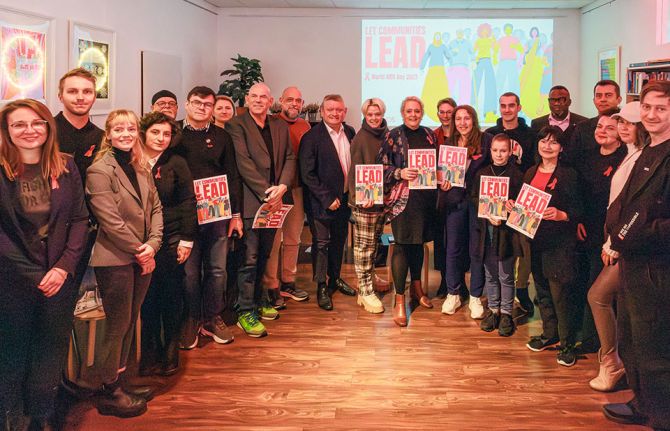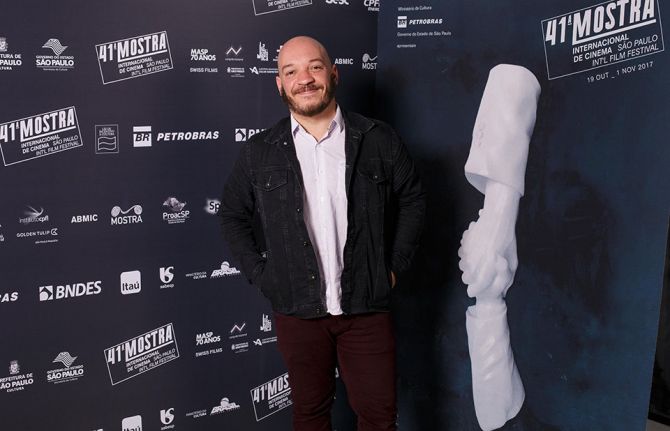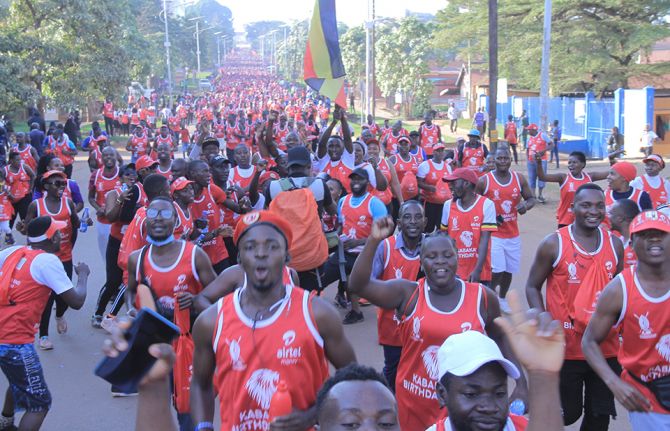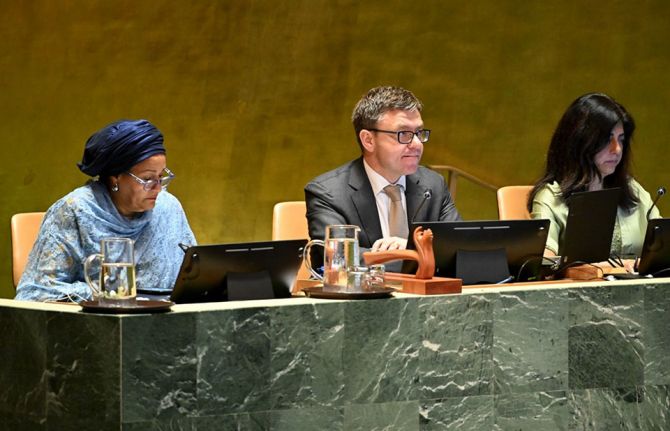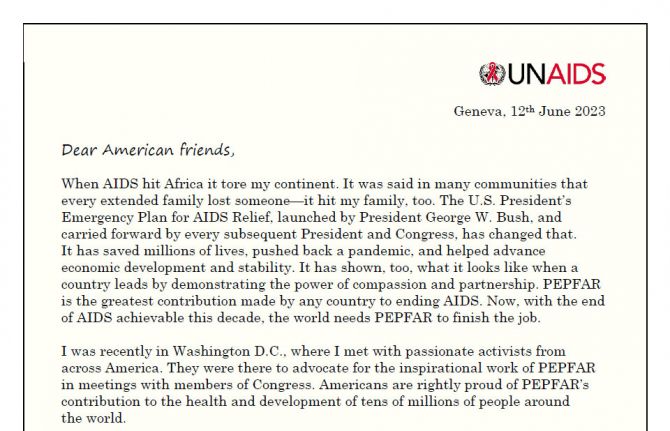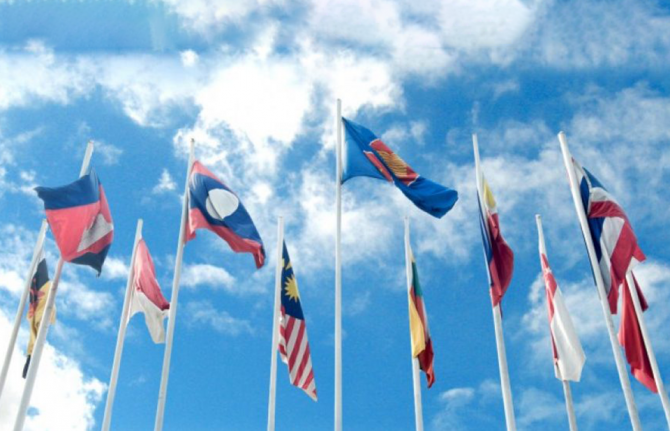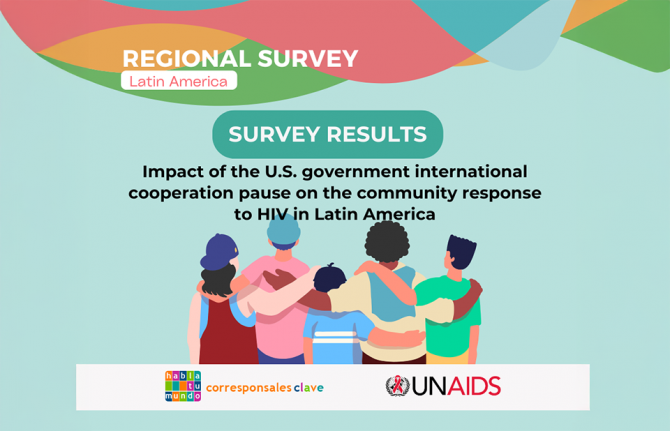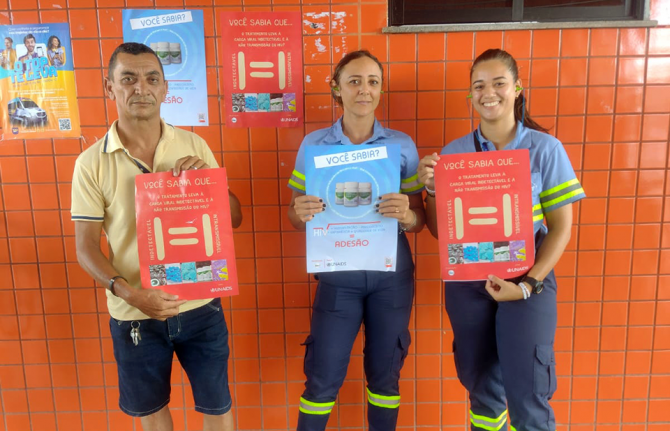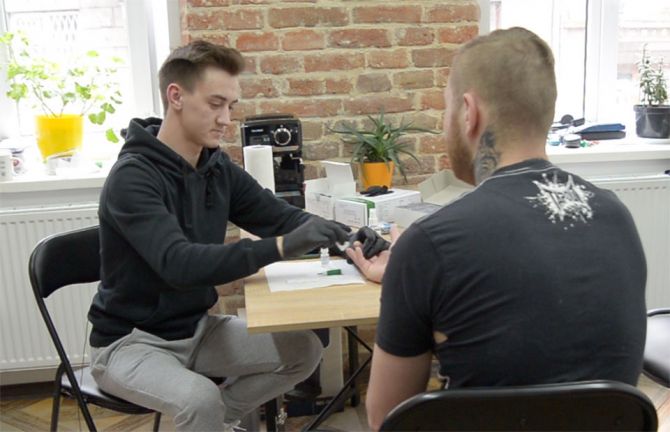
Feature Story
Olympics 2008: AIDS awareness training for young volunteers in China
25 June 2008
25 June 2008 25 June 2008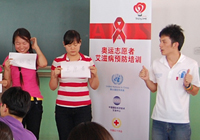
Fun and games during HIV training at
Beijing Modern Vocational and Technical
College. Photo credit: UNAIDS
It is early Sunday morning but the auditorium at Beijing Modern Vocational and Technical College is already full. Several hundred Olympic volunteers are chatting; waiting for the day’s training to start. The local representative of Beijing Youth League opens the workshop energetically with a clapping exercise. This course is very different to what students normally experience at this academic institution. Laughing and playing along the way, the students are learning about AIDS through a variety of games, presentations, quizzes and interactive question and answer sessions.
Countering discrimination
At the closing session, trainer Yu Xuan takes centre stage and asks the students what they think the probability is of them meeting a person living with HIV. The students say that they think that the probability of this is very low. “Well, you are in luck today,” Yu Xuan says. “I am HIV positive!” Most have never met an HIV positive person before and find it hard to believe that this young, handsome and energetic trainer is HIV positive. Immediately they recognize that they had false ideas and preconceptions about people living with HIV.
“When I was tested as HIV positive, I thought my life would end very soon. With the help and referral by local health services, I participated in activities organized by local HIV volunteers where I learned more about HIV, and got to know new friends,” Yu Xuan tells the volunteers. “I became aware that I could help others by sharing my knowledge, dispelling the myths about HIV, and communicate with the public as an HIV positive speaker.”
HIV is a reality rather than a distant possibility
The facilitator living with HIV, who are part of the team training Olympic volunteers, has been trained though a project called “Positive Talks”. This project is implemented by Marie Stopes International and supported by the Joint United Nations Programme on HIV/AIDS (UNAIDS) and the United Nations Development Programme (UNDP). The contribution of people living with HIV in China’s HIV prevention efforts is extremely valuable as they put a human face to the AIDS epidemic, which helps to reduce the discriminatory attitudes towards people living with HIV. They reinforce HIV prevention messages and make an impact on audiences by presenting HIV as a reality rather than a distant possibility.
“Many young people do not have the right information on AIDS, fuelling false fears, stigma and discrimination. This is bad in itself, but also hampers HIV prevention work,” said Bernhard Schwartländer, the UNAIDS Country Coordinator in China.
“Engaging some of China’s most capable young people and making them the messengers of positive and correct knowledge on HIV can help dispel inaccurate myths and break down the stigma and discrimination against people affected by HIV,” he said.
7,500 volunteers trained at 13 different universities
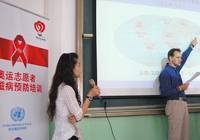
UNAIDS staff at the Beijing Modern
Vocational and Technical College training
young Olympic Volunteers.
Photo credit: UNAIDS
The training course is part of the volunteers’ preparation for service during the Beijing Olympic and Paralympic Games. Around 7,500 volunteers will have participated in the course in 13 different universities, while 100,000 volunteers will receive a basic information package on HIV. The training is a unique opportunity to equip Chinese youth with important knowledge and skills on HIV prevention and how to counter discrimination.
“We hope that through this training, Olympics volunteers, as ambassadors for Beijing citizens, will be better prepared to inclusively welcome all groups of people to Beijing during the Games, especially those living with HIV. It is our hope that Olympic volunteers will share this knowledge and look for opportunities to continue volunteering on important health and development issues such as raising awareness of HIV,” said UNDP Country Director Subinay Nandy.
Joint UN effort
The Olympic volunteer training programme is being convened by UNAIDS and United Nations Volunteers (UNV) and implemented in collaboration with the United Nations system in China, Beijing Youth League, Red Cross Society of China, Marie Stopes International (MSI) China.
The training teams include HIV experts from eight UN agencies: ILO, UNESCO, UNFPA, UNICEF, UNAIDS, UNODC, WHO and UNIFEM. The project, co-funded by UNAIDS, UNDP and UNV, is one of several initiatives between UNDP, UNV, the Beijing Youth League and other local partners within a partnership project aimed at strengthening volunteerism for development in China through the Beijing Olympic and Paralympic Games.
Olympics 2008: AIDS awareness training for young
Feature stories:
Carrying the Olympic flame for PLHIV in Tanzania (18 April 2008)
Chinese toolkit for HIV prevention launched in Beijing (09 October 2007)
China’s Olympic effort to raise AIDS awareness (12 September 2006)
Press centre:
UN trains Olympic volunteers on AIDS awareness (15 June 2008)
External links:
Related

Feature Story
HSH Princess Stephanie inaugurates new premises of Fight AIDS Monaco
20 June 2008
20 June 2008 20 June 2008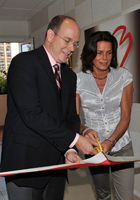
Princess Stephanie is the
President of Fight AIDS
Monaco which she helped to
found in 2004.
Photo credit: C.Luci
UNAIDS Special Representative Her Serene Highness Princess Stephanie inaugurated the new premises of Fight AIDS Monaco (FAM) on 13 June 2008.
Princess Stephanie is the President of Fight AIDS Monaco which she helped to found in 2004. As well as offering psychological and material support to people living with HIV and their families in Monaco, FAM also funds projects in Madagascar and Burundi. The organization regularly runs HIV information campaigns in local and regional media and prevention campaigns in schools and night clubs in Monaco.
The inauguration was attended by His Serene Highness Prince Albert II of Monaco as well as Government and Parliamentary representatives. Also in attendance were volunteers and staff from Fight AIDS Monaco, people living with HIV and representatives from UNAIDS.
UNAIDS Executive Director Dr Peter Piot sent a message of support saying that the new premises will give a space for constructive dialogue that is framed by tolerance and respect. Dr Piot also praised HSH Princess Stephanie for her committed work on the AIDS response and support of people living with HIV.
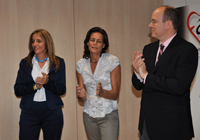
L to R: Mariangela Bavicchi Lerner,
UNAIDS Chief of Resource Mobilization,
Her Serene Highness Princess Stephanie
of Monaco and His Serene Highness
Prince Albert II of Monaco during the
inauguration of the new premises.
Photo credit: C.Luci
The new premises will enable volunteers and staff of Fight AIDS Monaco to offer a range of services to some 150 people living with or affected by HIV. The space will allow the facilitation of group activities such as computer courses, yoga sessions and theatre courses. The organization also plans to offer more community events and outings to sporting events and concerts.
In October 2006 Princess Stephanie became a UNAIDS Special Representative choosing to focus on raising awareness on prevention and discrimination issues. Her Serene Highness is very active in a range of ways including organizing fundraising events such as a Gala dinner and concert in March this year, convening conferences and meetings to empower networks of people living with HIV, and highlighting the issue of stigma and discrimination towards people living with HIV.
HSH Princess Stephanie inaugurates new premises o
Press centre:
Read UNAIDS Executive Director's message of support (in french)
Read press release (in french)
H.S.H. Princess of Monaco accepts appointment as UNAIDS Special Representative (6 October 2006)
Feature stories:
HIV positive leaders meet in Monaco (25 January 2008)
Princess Stephanie of Monaco visits Madagascar (9 November 2007)
UNAIDS Special Representative HSH Princess Stephanie of Monaco leads creative AIDS fundraising activities (7 December 2006)
External links:
Related

Feature Story
Hindu faith leaders commit to AIDS response
18 June 2008
18 June 2008 18 June 2008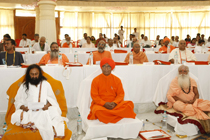
Senior Hindu religious leaders agreed to join
the national effort to reverse the spread of
HIV at the first meeting of “Faith in Action:
Hindu Leaders Caucus on HIV/AIDS”.
In a historic initiative by Hindu religious groups, over 70 prominent faith leaders from across India came together to commit to incorporating HIV information into their religious education and training of future faith leaders as well as including AIDS in their discourses, rituals and festival celebrations.
Senior Hindu religious leaders agreed to join the national effort to reverse the spread of HIV at the first meeting of “Faith in Action: Hindu Leaders Caucus on HIV/AIDS”, which took place 1-2 June 2008 at the Art of Living International Centre in Bangalore, India.
Coming together to sign a joint declaration, the religious leaders committed to working with UNAIDS and the National AIDS Control Programme (NACP) to increase HIV awareness among young people and to end stigma and discrimination against people living with HIV.
Since the early 1990s faith-based organizations have played a leading role in the AIDS response in regions like southern Africa. Hindu groups, along with other religious organizations, have mobilized strongly against AIDS in Africa but this is the first time that such an initiative has taken shape in India.
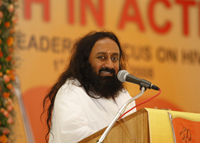
“Stigma around the disease can only be
overcome if religious leaders speak about
it openly,” said Sri Sri Ravi Shankar,
founder, Art of Living Foundation.
“Stigma around the disease can only be overcome if religious leaders speak about it openly,” said Sri Sri Ravi Shankar, founder, Art of Living Foundation. Sri Sri Ravi Shankar will lead a steering committee that will ensure follow-up action by Hindu religious groups across India. This will include training of peer educator networks, prominent public messages to spread awareness and support for families affected by AIDS.
The action plan for the Hindu Leaders Caucus on HIV and AIDS envisages integrating the initiatives of Hindu leaders with State AIDS Control Societies to maximize their influence to spread positive messages in communities.
Hailing the initiative, UNAIDS Country Coordinator in India, Dr Denis Broun said, “continuous guidance from religious leaders will help many people to overcome their prejudice towards people living with HIV as HIV positive people can live a full life and contribute greatly to society.”
JVR Prasada Rao, Director UNAIDS Support Team for Asia and the Pacific said, “Hindu religious leaders can play a big role in our efforts to reverse the epidemic.”

Mr Oscar Fernandes, Minister of State for
labour and employment said that religious
leaders participation can make a
difference not only to AIDS in India but to
addressing it globally.
His sentiments were echoed by Mr Oscar Fernandes, Minister of State for labour and employment and Convenor of the Parliamentary Forum on AIDS, who said that religious leaders participation can make a difference not only to AIDS in India but to addressing it globally.
There are approximately 920 million Hindus globally making Hinduism the third largest religion in the world after Christianity and Islam.
The two-day conference was jointly organized by the Art of Living Foundation, UNAIDS and the Asian Interfaith Network on AIDS (AINA). In addition to faith leaders, 200 other delegates took part in the event including representatives of the National AIDS Control Organization (NACO), state AIDS control societies, members of Parliament, officials from the ministry of health and family welfare, UN agencies as well as non-governmental organizations. Representatives from the World Conference of Religions for Peace and other faith-based organizations also attended.
Hindu faith leaders commit to AIDS response

Feature Story
Powerful film brings AIDS issues to communities in Democratic Republic of Congo
16 June 2008
16 June 2008 16 June 2008
Powerful film brings AIDS issues to
communities in Democratic
Republic of Congo
When we talk about AIDS we often look at the sobering statistics such as the estimated number of 22.5 million people living with HIV in sub-Saharan Africa in 2007.
But behind each number is a human face and an actual person whose life is affected in a very direct way by the disease. A pioneering film series made in the Democratic Republic of Congo (DRC) aims to bring the issue of AIDS directly to communities in a way that people can easily relate to.
Echoing the culture of oral story-telling which is deeply rooted in African tradition, the first episode of the series “Mon histoire” is named after the narrator and central character Papy. Based on a true story, the actors speak in Lingala, one of the official languages of DRC, and the cast are all Congolese. In this way, the film’s young director Djo Tunda Wa Munga hopes the film would touch people directly rather than be a passive viewing experience.
“Papy” is hard-hitting and aims to make an impact on audiences to cut through complacency towards AIDS send a strong prevention message while empowering people living with HIV to stand up and speak out in their own voices. With familiar and realistic images of how life can be if you are diagnosed with HIV, the film could encourage more people to have voluntary counseling and testing.
Djo Munga collaborated closely with Congolese non-governmental organizations and networks of people living with HIV during the planning and making of the film. Believing these films have the power to transform, German agency for technical cooperation (GTZ), Belgian agency for technical cooperation (BTC) and the King Baudouin Foundation have supported the project financially and with marketing support.

Films are a good way to answer the questions
people have about AIDS and help to
communicate prevention messages.
"Stories – such as “Papy” – that are told through local languages speak to audiences in a very direct way. Films are a good way to answer the questions people have about AIDS and help to communicate prevention messages. By doing this they have a strong role in changing individual behaviour,” said UNAIDS Executive Director, Dr Peter Piot.
In the presence of the Congolese Health Minister, the film was premiered in Kinshasa 22 September 2007, followed by a European premier in Brussels four days later attended by local and international media. Since then, it has been screened at International Film Festivals in Namur, Paris, Montreal, Abidjan and Cannes and in provinces across Congo as well as broadcast on national and regional television channels.
The public viewings in DRC have been a huge success, taking place in town centres in front of audiences of up to 1200 people which were followed by a public discussion with provincial authorities, civil society and community members.
To enable the film and its message to reach an even wider audience, BTC has funded its distribution to organizations across Congo in DVD format with sub-titles in Swahili, Tshiluba, French and Kikongo, commonly-spoken languages in the region. And in partnership with GTZ, an evaluation by questionnaire will be conducted among the local organizations with they work. CTB has also supported a radio version of Papy in Lingala, Tshiluba, Kikongo, Swahili and French which will be broadcast by among others Radio Okapi.
Future plans include more mobile screenings across DRC to reach more remote parts of the country, with the support of the World Bank.
For more information about this project contact Denis Haveaux, UNAIDS Liaison Office to the European Union
Tel. +32 2 502 9825 | haveauxd@unaids.org
Powerful film brings AIDS issues to communities i

Feature Story
2008 High-Level Meeting on AIDS concludes in New York
12 June 2008
12 June 2008 12 June 2008
The 2008 United Nations High-level Meeting on AIDS concluded Wednesday evening, 11 June 2008. The meeting was attended by stakeholders from across the global AIDS response, including leaders from national governments, civil society groups and United Nations agencies.
The General Assembly gathering was held to review progress made in implementing the 2001 Declaration of Commitment on HIV/AIDS and the 2006 Political Declaration on HIV/AIDS. Discussions focused on the important progress made to date, the challenges that remain, and recommendations for ensuring a sustainable response for the future.
UN Secretary-General Ban Ki-moon presented a comprehensive report based on national progress reports from 147 countries. The report showed that although a significant amount of work still needs to be done, progress had been made in almost every region of the world.
The Secretary-General noted that halting and reversing the spread of AIDS was not only a Millennium Development Goal in itself but also a prerequisite for reaching many of the other goals. The effectiveness of the AIDS response will impact efforts to reduce poverty, improve nutrition, reduce child mortality and improve maternal health and curb the spread of tuberculosis.
UNAIDS Executive Director Dr Peter Piot stressed how important it is for countries to remain committed to the global AIDS response and to work hard to make universal access to HIV prevention and treatment a reality. He noted that these goals will require significant long term efforts, but also recognized the importance of optimism. "AIDS may be one of the defining issues of our time," he said, "but it is clearly now a problem with a solution."
Countries have been guided in their response to the AIDS epidemic by the 2001 Declaration of Commitment on AIDS and the 2006 Political Declaration. The two declarations have played an important role in raising global awareness of HIV and in coordinating efforts to scale up access to HIV prevention, treatment care and support.
The head of the Russian delegation expressed their commitment to the response saying that Russia was ready to ‘assume leadership on AIDS in the region, in understanding the epidemic and in taking responsibility for expanding technical, financial and organizational assistance.
China commended the UN’s ‘unswerving efforts’ to promote global concerted action against AIDS and called its own country’s HIV prevention and treatment efforts ‘strategic issues, vital to the survival of a nation’.
Argentina , who has made the right to health a constitutional right since 1994, highlighted the need to continue working to remove juridical barriers that are undermining the response to the epidemic.
Civil society was strongly represented at the meeting. Representatives from groups from around the world participated in a wide variety of forums, providing essential insight into communities' work to respond to AIDS. On Tuesday 10 June, an interactive civil society hearing was convened with Member States and observers to discuss the myths and realities of scaling up to universal access.
Addressing the hearing via video conference, Mark Heywood, a Representative of International Council of AIDS Service Organizations (ICASO) shared some strong words about the importance of human rights issues in the response to AIDS. He said it was a ‘duty of governments, not a choice, and a duty of civil society to hold governments up to the standards they have accepted on paper’.
The High-level Meeting also featured a series of panel discussions about critical topics in the AIDS response, including universal access, leadership in countries with concentrated epidemics, gender equality, and the long-term response.
2008 High-Level Meeting on AIDS concludes in New
External links:
2008 High-Level Meeting on AIDS official web site
Press centre:
Read closing press release - Global AIDS epidemic far from over (13 June 2008)
Read concluding remarks by the President of the United Nations General Assembly (12 June 2008)
Read statement by UNAIDS Executive Director Dr Peter Piot at the UN General Assembly High Level Meeting on AIDS (10 June 2008)
Read press release – 9 June 2008 ( en | fr | es | ru | ch )
Multimedia:
2008 High-level Meeting Webcast
View photo gallery
Publications:
Report of the Secretary-General: Declaration of Commitment on HIV/AIDS and Political Declaration on HIV/AIDS: midway to the Millennium Development Goals [A/62/780] ( en | fr | es | ru | ar | ch )
2001 Declaration of commitment on HIV/AIDS (pdf, 1.84 Mb)
Related

Feature Story
The President of El Salvador meets with UNAIDS Executive Director
11 June 2008
11 June 2008 11 June 2008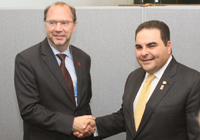
UNAIDS Executive DIrector Dr Peter Piot
(left) and President Elías Antonio Saca of
El Salvador (right) during the signing of
the Memorandum of Understanding
between the Republic of El Salvador and
UNAIDS.
President Elías Antonio Saca of El Salvador hosted a meeting with UNAIDS Executive Director Dr Peter Piot on 10 June at the United Nations HQ in New York. On this occasion, a regional Memorandum of Understanding between the Republic of El Salvador and UNAIDS was signed.
Under the terms of this agreement, UNAIDS will provide support for the establishment of a Technical Support Secretariat (TS Secretariat) of the Regional Coordination Mechanism on HIV (RCM) to be located in El Salvador. The aim of the TS Secretariat is to enhance coordination between donors, national AIDS programmes, national and regional institutions, and other public and private sectors parties. UNAIDS will also support the TS secretariat by providing them with key tools, technical resources and up to date information on AIDS.
The RCM is a regional body that supports the management and oversight of the AIDS response in Central America. It was established by the Council of Ministers of Health of Central America (COMISCA) and has already made a significant difference.
This new Secretariat aims to enhance coordination of the AIDS response in Central America by identifying areas of regional collaboration including harmonization of procedures for procurement of AIDS related commodities and supplies and promote partnerships with civil society, private and public sector and donors in the region.
By working closely with the heads of the Central America National AIDS Programmes the TS Secretariat will coordinate the technical assistance needs in the region and widely share information resources, best practices and tools. It also aims to identify opportunities for collaboration with other regional partners such as the International Centre for Technical Cooperation on HIV/AIDS in Brazil.
Regional cooperation in health is recognized as being highly effective for coordination, harmonization and political dialogue.
The Memorandum of Understanding was signed on behalf of the Government of El Salvador by Minister of Foreign Affairs Marisol de Argueta, and by UNAIDS Deputy Executive Director Michel Sidibe on behalf of UNAIDS.
The President of El Salvador meets with UNAIDS Ex
External links:

Feature Story
Civil society interactive hearing
11 June 2008
11 June 2008 11 June 2008
The President of the General Assembly
H.E. Mr Srgjan Kerim (center) chaired the
interactive civil society hearing.
Representatives of civil society organizations addressed Member States and observers on Tuesday 10th June in an interactive hearing at the High-level Meeting on AIDS entitled Action for Universal Access 2010: Myths and Realities.
The hearing was chaired by the President of the General Assembly and the UN Secretary-General made opening remarks. Following the opening, civil society speakers brought frontline experiences to the session, addressing the challenging issues that underlie the spread of the epidemic. They stressed the importance of accountability and involvement to fulfil targets set on the Declaration of Commitment and Universal Access.
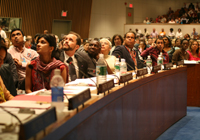
Representatives of civil society organizations
addressed Member States and observers on
Tuesday 10th June in an interactive hearing
at the High-level Meeting on AIDS
The speakers also highlighted some of the myths that have become barriers to an effective response to the epidemic. The hearing provided an open forum to discuss these myths and realities and the urgent work needed to achieve universal access by 2010.
Civil society speakers addressed issues related to achieving universal access from a number of different perspectives such as HIV and human rights, sex workers, sexual minorities, people who use drugs, women and girls, children, access to treatment, HIV-related travel restrictions, mobility and migration, workplace responses and civil society involvement and AIDS accountability.
Following an open call for nominations, which yielded more than 250 proposed speakers, the civil society Task Force recommended speakers to the President of the General Assembly. The selection was based on criteria established by the Civil Society Task Force, which included experience, people living with HIV, gender and regional diversity.
Civil society interactive hearing

Feature Story
2008 High-level Meeting on AIDS opens
10 June 2008
10 June 2008 10 June 2008
2008 High-level Meeting on AIDS, General
Assembly, United Nations, New York.
10-11 June 2008
The 2008 High-level Meeting on AIDS opens today at the United Nations General Assembly in New York.
Over the next two days the President of the General Assembly Srgjan Kerim, UN Secretary-General Ban Ki-moon, approximately 6 Heads of State and Government and over 80 ministers, senior officials, representatives of international organizations and civil society will meet to review progress towards the targets agreed in the UN’s 2001 Declaration of Commitment on HIV/AIDS and the 2006 Political Declaration on HIV/AIDS.
The UN Secretary-General will present his analytical report on the progress made and the challenges that remain in the global response to AIDS. The report is based on 147 national progress reports submitted to UNAIDS at the end of January 2008.
The High-level Meeting will provide an important forum for leaders from government, international organizations and civil society. In addition to reviewing progress, discussions are expected to cover the remaining challenges and explore sustainable ways of overcoming them.
Read more on the 2008 High-level Meeting on AIDS
Visit the official web site
2008 High-level Meeting on AIDS opens
Publications:
UN Secretary-General’s progress report on AIDS ( en | fr | es | ru | ar | ch )
2001 Declaration of commitment on HIV/AIDS (pdf, 1.84 Mb)
Related

Feature Story
Universal access to affordable AIDS commodities
09 June 2008
09 June 2008 09 June 2008
The availability of affordable commodities,
including quality medicines and diagnostics,
is a key factor for moving towards universal
access
As part of the 2008 High level Meeting on AIDS, a special event entitled “Universal access to affordable diagnostics, prevention and treatment: In search for sustainable solutions” will be held on 9th June in the United Nations Headquarters, New York.
The event, co-organized by UNAIDS, UNOHRLLS and UNOSAA aims to explore potential actions to improve availability of affordable commodities for the achievement of the Millennium Development Goals (MDGs).
The availability of affordable commodities, including quality medicines and diagnostics, is a key factor for moving towards universal access. Despite that antiretroviral coverage rose by 46.5 per cent in 2007, reaching 3 million people in low-income and middle-income countries - approximately 30 per cent of those in need - the price of newer drugs and diagnostics are still high in many parts of the world. Furthermore, an increasing number of people on HIV treatment will need to switch from first-line antiretroviral treatment to second- and third-line combinations in the near future.
HIV Prevention efforts are equally affected by affordability issues, jeopardizing efforts to scale up implementation strategies to prevent mother to child transmission, ensure blood safety, and ensure wide access to preventive measures such as condoms and harm reduction measures.
Countries are trying to deal with these challenges, with varying degrees of success. Between 1997 and 2004, Brazil succeeded in reducing the average cost of antiretroviral drugs to almost one fifth of the original cost, through the use of multiple strategies, such as the local production of generic drugs and price negotiations with pharmaceutical companies. There are also several examples of global collaboration towards improving the availability of affordable commodities, such as the Clinton Foundation, which has been highly successful in negotiating price reduction for antiretroviral drugs in over 60 countries.
However, as countries move to scale up their national AIDS responses, many continue to face difficulties and have expressed frustration in negotiating better access to commodities. Much remains to be done, especially with regards to issues of intellectual property rights, product development processes, demand forecasting, procurement systems, and legislation.
The meeting will be opened by Mr. Cheick Sidi Diarra, Under-Secretary-General and High Representative for the Least Developed Countries, Landlocked Developing Countries and Small Island Developing States, followed by a keynote address by H.E. Mr. Faure Gnassingbe, President of Togo.
Following the presentation, a panel discussion will be moderated by UNAIDS Deputy Executive Director Mr. Michel Sidibe. This panel will further discuss the challenges faced by countries in accessing affordable commodities. Speakers at the discussion panel will include H.E. Ms. Nilcea Freire, Minister of Women’s Affairs, Brazil, H.E.Dr. Brian Chituwo, Minister of Health, Zambia, Ms. Rolake Odetoyinbo, Positive Action for Treatment Access (PATA), Nigeria and Mr. Jeffrey L. Sturchio, Vice President, Merck.
Universal access to affordable AIDS commodities
Related

Feature Story
Securing our future: Final report from Commission on HIV/AIDS and Governance in Africa
09 June 2008
09 June 2008 09 June 2008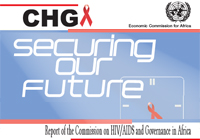
The Commission on HIV/AIDS and
Governance in Africa (CHGA) will present
its final report "Securing Our Future" to UN
Secretary-General Ban Ki-moon
The Commission on HIV/AIDS and Governance in Africa (CHGA) will present its final report "Securing Our Future" to UN Secretary-General Ban Ki-moon on 9 June 2008 at UN Headquarters. This will be followed by a high-level panel discussion on “Regional lessons in the progress towards universal access.”
UN Secretary General Kofi Annan established the Commission in 2003 under the leadership of the Executive Secretary of the UN Economic Commission for Africa, K.Y. Amoako and 20 Commissioners, including UNAIDS Executive Director Dr Peter Piot.
The Commission’s brief was to advise African governments on the extent of the AIDS epidemic’s impact on African social, political and economic institutions and on the appropriate policy responses and programmes that need to be taken in order to address the unique challenges posed by the multiple ways in which the epidemic impacts upon development and governance on the continent.
The 280 page report includes an analysis of findings and a series of key recommendations. It is the culmination of a wide consultation by the CHGA Commission¬ers in Africa and beyond. The findings and recommenda¬tions reflect the views of the more than 1,000 Africans—including policymakers, advocacy groups, nongovernmental organizations, community-based organizations, people living with HIV, research organizations and UN agen¬cies—who took part in the consultation process.
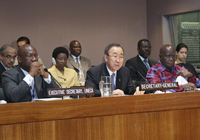
Secretary-General Ban Ki-moon addresses the launch of the report of the Commission on HIV and AIDS and Governance in Africa and high-level panel discussion on "Keeping the promise: Lessons in the progress towards universal access."
Credit: UN Photo/Eskinder Debebe
During its lifespan the Commission held five sub-regional consultations to engage with a wide range of stakeholders and constituencies. Each interactive session provided an opportunity to share experiences and discuss the way forward in their sub-regional context.
AIDS has already had limiting consequences on social and economic development in Africa. The Commission concludes that the epidemic will have dire implications for governance for years to come unless decisive actions deepen the commitment and leadership to the AIDS response. This includes leadership within each African society at national and local level, by governments and political leaders, donors, civil society, tradi¬tional and community leaders and people living with HIV.
|
|




